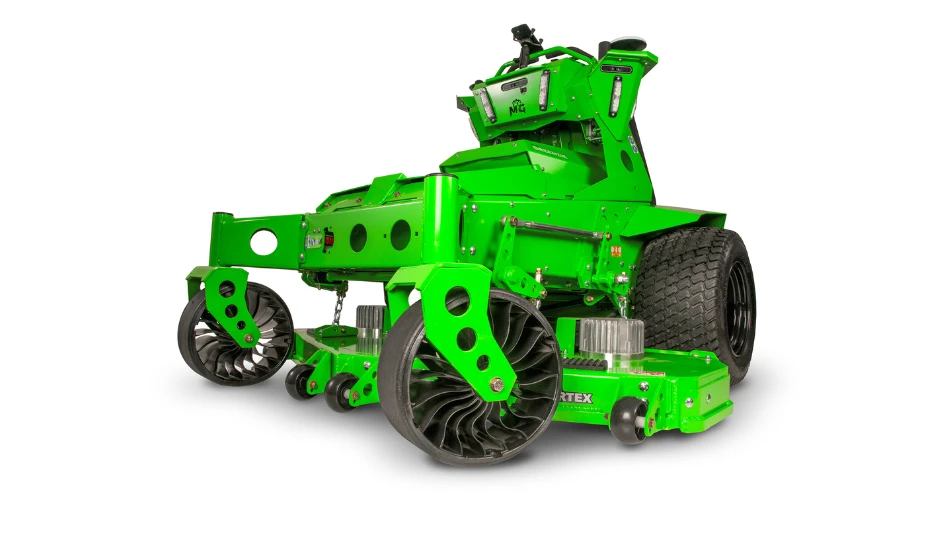 After working for a sprinkler contractor for several years, brothers Tom (inset, right) and Bob Schaefer decided it was something they wanted to do on their own. They had mastered the installations and knew they liked the work. What began back in March of 1980 as their small sprinkler operation has evolved into a well-established business. But one thing that’s never changed is the company’s sole focus on irrigation.
After working for a sprinkler contractor for several years, brothers Tom (inset, right) and Bob Schaefer decided it was something they wanted to do on their own. They had mastered the installations and knew they liked the work. What began back in March of 1980 as their small sprinkler operation has evolved into a well-established business. But one thing that’s never changed is the company’s sole focus on irrigation.
Although they’ve been asked to do all kinds of other services over the years – particularly lawn care and snow removal – the brothers have held firm on offering only irrigation services through their Lakewood, Colo.-based company, Schaefer Lawn Sprinklers.
In a post-recession period where so many companies are diversifying to drive more revenue, they talk about why staying the course has been the most successful strategy for their business and what the company has learned in its three decades of doing business.
An uncertain start. When the brothers first opened shop 33 years ago, they were good at what they did. They knew the work well. But what they didn’t know was the business side. Both readily admit looking back that they didn’t have the “business sense” to make their early years profitable.
“We were getting a lot of jobs but the truth was we didn’t have the business expertise,” Tom says. “We’re ditch diggers – not businessmen. So we had to be honest with ourselves and admit that we needed help.”
That help came in the form of an irrigation business consultant. “Back then it was around $750 for a two-day intensive seminar,” Bob says. “We learned so much in those two days it was incredible. He left us saying that if we followed the business model and plans he had laid out that we’d have $10,000 in the bank by spring. We were shocked because we had been living hand-to-mouth up until that point and had built some debt.
|
Key trends during three decades With 33 years in the business, brothers Tom and Bob Schaefer of Schaefer Lawn Sprinklers, based in Denver, have seen the irrigation industry evolve and change. The brothers say that some of the biggest changes have been in the last five years as the focus on water efficiency has heightened. Tom shares the trends that he’s noticed over the years. An efficiency focus. The biggest trend in Colorado has been the shift toward more efficient sprinkler systems, Schaefer says. As rebates have become available, helping encourage people to save more water, customers have also become increasingly educated. A precious commodity. The attitude towards water as a commodity has also drastically changed, Schaefer says. In 1980, people didn’t think much about their water usage. They paid a low, fixed rate, no matter how much they used. But with water prices increasing and water shortages developing, people are starting to realize just how precious water is, he says. Expanding technology. Schaefer says that technology has come so far since he first started out in business. The weather-based sensors and smart controllers are revolutionizing the industry. That has also meant staying abreast of the evolving technology. “With this new technology comes great opportunity but you have to choose to stay on top of it,” he says. |
“But we did follow the business model and began to become profitable. We were already very good at the work we did and as we came to understand the business side, we started seeing a lot of success. But it required us to admit we needed to lean on resources and someone else’s business expertise to get things going.”
Building business. One of the key ways that the brothers started building an account list was by offering no down payment. Most of their competition required at least some money down for sprinkler services.
“We understood that we were two young guys who were just starting their business and we simply couldn’t give our customers a lot of reason to trust us,” Tom says. “We didn’t have a long list of references. So we worked with payment upon completion and told our customers they didn’t have to pay us a penny until we were done. That worked really well.”
Tom says that offering a five-year parts and labor warranty also helped differentiate them from the competition. Most were offering a one-year warranty and didn’t always offer both parts and labor. These early strategies really paid off in building a loyal customer base.
“Today the company has approximately 9,500 customers in their database. Both brothers attribute much of their success to the fact that they continue to cater to existing clientele instead of constantly going after new jobs. “Even when so many others were just hungry for those new installs, we’ve always paid attention to our existing customer base,” Tom says.“That served us well in the recession period because there were no new install jobs around and yet we continued to get work because we have a loyal base that bring us back to the property year after year for maintenance jobs.”
Getting involved with retrofits has also become a niche for the company, made successful by their strong base of existing customers to go back to. “As the technology has evolved, we’ve had more and more opportunity to offer retrofits,” Bob says.
Both brothers say that without the support of the team they’ve built, they wouldn’t be as successful as they are today. They say that hardworking and loyal employees are just as instrumental to the company’s success as strong ownership.
Customer loyalty. Building strong relationships with clients has always been a top priority for the brothers. Customers come to trust them and use their services again and again. Now when they go to see a new client, they have a list of references with happy and still-loyal customers dating back to the 80s. This strong reputation has also allowed the company to not only hold their prices firm in a market of low-ballers, but to almost always be the highest bid – and still consistently get work.
“In the Denver Metro area, I’m able to bid my jobs higher than other contractors because of the ways we’ve differentiated ourselves from the competition,” Bob says.
“And even in these tough times, we’re still getting those jobs. The difference is that we’re going out and spending time with the client. We’re not just looking to put in the lowest price. One of my specialties with the business is meeting with the clients, and I’ll go out and measure the yard and show them an actual blueprint drawing.
“I’ll also get together all the rebate information so they’ll know exactly how much they can get back and I’ll use our historic data to show them how much water they’ll save over time. All of that extra effort pays off and allows us to charge more.”
The strong tie with customers has also lead to a number of requests over the years.
“We get a lot of questions about whether we can mow a lawn or do some plowing,” Bob says. “We’ve had a lot of opportunity but we’ve never felt it was right for us. I think one of the biggest mistakes that businesses make these days is becoming a jack of all trades but a master of none. We didn’t want that to happen to us. We never wanted to lose sight of what we’re truly good at, which is sprinklers.”
Tom says the brothers always felt there was room for improvement in what they already offered, instead of deviating from that specialty to offer something new.
“We have always focused our effort on becoming even better at what we already do instead of putting our attention elsewhere,” Tom says.
“We want to be the very best at doing sprinklers instead of branching out so much that we are no longer focused on our specialty. We’ve seen other companies become bigger and bigger by continually adding services, but in the end they become so spread out that they’re not really focused on the core company any longer.
“My feeling is that the sooner you can find your specific niche, the better off you are because then you can start becoming a true expert at it.”
Photos courtesy of Schaefer Lawn Sprinklers

Explore the October 2013 Issue
Check out more from this issue and find your next story to read.
Latest from Lawn & Landscape
- Connect, Control & Conserve with Horizon Technical Services
- Use Horizon's Parts Hotline
- How I built a Top 100 company
- Horizon’s Exclusive TurfGro Fertilizer
- Grow your business with mosquito control
- LandCare adds 2 branches in SoCal, promotes Aleman to branch manager
- Spray them away
- PERC helps debut propane direct-injection fuel system at ACT Expo 2025





